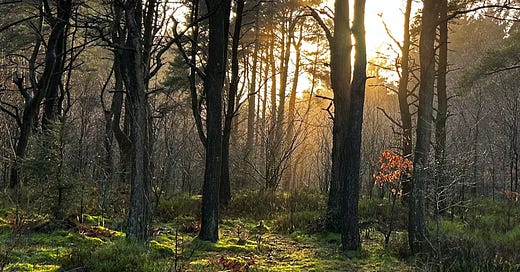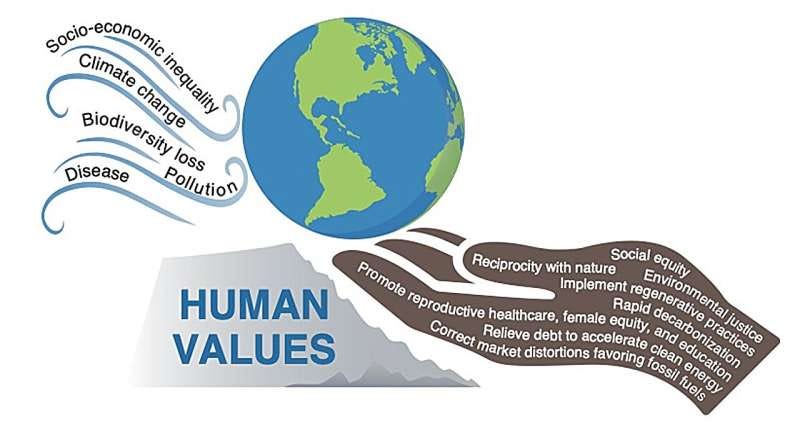"Earth is our lifeboat in the cosmic sea of space. We must stop treating environmental challenges as isolated issues and establish a systemic response based on kinship with nature, recognizing our interconnectedness with the planet."
An international team of experts has collaborated on a groundbreaking publication in PNAS Nexus, “Earth at risk: An urgent call to end the age of destruction and forge a just and sustainable future”, underscoring the critical imperative to harmonise political will, economic resources, and societal values for a regenerative and just global future.
Researchers led by the University of Hawai'i at Mānoa, an interdisciplinary group of 18 authors bring together a diverse range of expertise in Earth and ocean sciences, politics, law, public health, renewable energy, geography, communications, and ethnic studies. Their collective efforts assess the root causes, far-reaching impacts, and innovative solutions to address a myriad of pressing global crises.
It calls for "A systemic change in human values is needed that focuses on Earth-centered governance, prioritizing long-term ecological health and social well-being over immediate gains."
Reciprocity with Nature
The paper is timely, resonates with, and indeed adds academic rigour to the growing Nature-Postive agenda. The core messages underscore the urgent need for comprehensive and integrated action to address the interconnected crises of climate change, ecological destruction, disease, pollution, and socioeconomic inequality facing our planet including …
Urgent Decarbonisation: There is a critical need for immediate action to reduce greenhouse gas emissions and combat climate change
Reciprocity with Nature: Emphasising the importance of fostering a balanced relationship with nature to ensure sustainability and ecological integrity
Regenerative Practices: Advocating for the implementation of regenerative practices in natural resource management to promote environmental restoration
Elimination of Detrimental Subsidies: Calling for the removal of harmful subsidies that contribute to environmental degradation
Promotion of Equitable Human Development: Supporting initiatives that prioritise fair and inclusive human development to address socioeconomic inequality
Transformative Financial Support: Urging financial support for lower-income nations to facilitate their transition towards sustainability
Paradigm Shift: Highlighting the necessity of shifting from exploitative capitalism to an economic model that prioritises sustainability, resilience, and justice
Global Cultural Shift: Advocating for a global cultural transformation that values kinship with nature and communal well-being, recognising Earth's finite resources and interconnectedness
Collective Action: Stressing the importance of harnessing political will, economic resources, and societal values to steer towards a future where human progress aligns with ecological integrity and social equity
Systemic Change in Human Values: Calling for a shift in human values towards Earth-centered governance and prioritising long-term ecological health and social well-being over immediate gains
Kinship
Nature is not a commodity for exploitation, but a living system with its own rights, where humans are life-supported and in turn play a regenerative role. This kinship promotes nature and humanity thriving together
From the paper …”An Indigenous worldview, that of kinship with nature, should define sustainable practices. Laws that establish legal rights for nature have reached a critical point at which they may either be normalized or marginalized; this progress must be sustained”
Traditional Land Management: Indigenous peoples often have deep-rooted knowledge of sustainable land management practices that have been passed down through generations. This includes techniques that promote biodiversity, carbon sequestration, and ecosystem restoration
Maximizing Resources: Indigenous land management practices focus on maximizing the use of resources while ensuring long-term sustainability. This approach can lead to reduced deforestation, degradation, and carbon emissions compared to non-protected areas
Biocultural Diversity: Indigenous perspectives emphasize the interconnectedness between humans and nature, promoting a holistic approach to conservation that considers cultural, spiritual, and ecological values
Legal Rights for Nature: Some indigenous communities have successfully advocated for legal rights for nature, granting personhood to natural entities like rivers and national parks. This recognition allows nature to have a legal voice and promotes a more balanced relationship between humans and the environment
Regenerative Practices: Indigenous worldviews, centered on kinship with nature, offer valuable insights into regenerative practices that can help restore ecosystems, enhance human health and resilience, and provide for future generations
See also the Regen/Notes articles:




